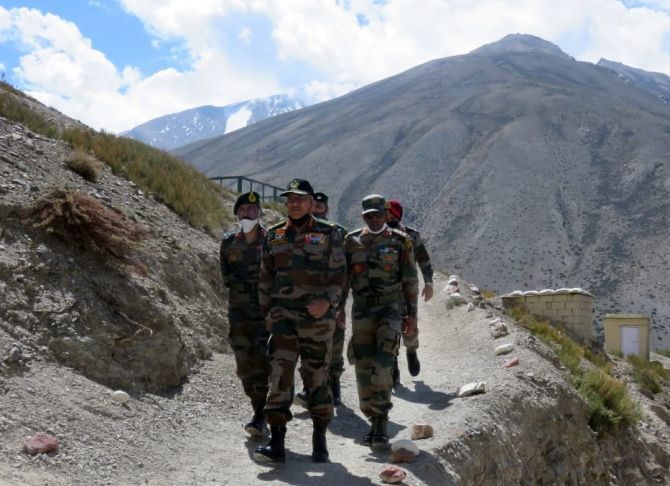China and India should be partners, rather than rivals, Chinese Ambassador to India Sun Weidong said on Friday, noting that border question left over by history is 'sensitive and complicated' and there was a need to find 'a fair and reasonable solution mutually acceptable' through equal consultation and peaceful negotiation.

In remarks titled 'Implement Consensus and Handle Differences Properly to Bring China-India Relations Back on the Right Track' posted on the Chinese embassy website, Sun spoke of disruptions in the bilateral relationship and outlined five steps to clarify 'some fundamental points'.
He said China and India need peace rather than confrontation, need to pursue win-win cooperation instead of a zero-sum game, need to build trust, rather than suspicion and relations should move forward rather than backward.
He said pending an ultimate settlement to the boundary question, the two sides have agreed to work together to maintain peace and tranquillity in the border areas.
The Chinese ambassador began his statement by mentioning the violent face-off between Indian and Chinese troops in Galwan Valley and said it was a situation both countries will not like to see.
'On June 15, there was an incident causing casualties at the Galwan Valley in the western sector of the China-India border. It was a situation neither China nor India would like to see,' he said.
Sun referred to July 5 conversation between Special Representatives of the China-India Boundary Question, State Councilor and Foreign Minister Wang Yi and Indian National Security Adviser Ajit Doval and the positive consensus reached on easing the current border situation.
'Currently, our front line troops are disengaging on the ground in accordance with the consensus reached by the Military Corp Commander talks,' he said.
He said at the backdrop of what recently happened at the Galwan Valley, 'some quarters in India raise doubts about the consensus reached by the two leaders, and have wrong perception of the direction of China-India relations'.
Sun said China has all along advocated that peace is of paramount importance and it was 'neither a warlike state nor an assertive country'.
'The right and wrong of what recently happened at the Galwan Valley is very clear. China will firmly safeguard its sovereignty and territorial integrity, and ensure the peace and tranquillity in the border areas,' he said.
'I believe China and India have the wisdom and capability to properly handle differences and not fall into the trap of conflict. We should seek common development as partners rather than opponents or adversaries. Why should we fight against each other that will only hurt those close to us and gladden the foes?' he added.
He also China-India relations have gone far beyond the bilateral scope and have global strategic significance in the backdrop of the current international landscape.
'Now the China-India relations are facing a complex situation. We should take a broader and far-sighted view, work together to overcome and turn it around as soon as possible,' he said.
'We should meet each other halfway, expand the positive dimension of cooperation, narrow down negative factors and refrain from doing harm to mutual trust and cooperation,' he added.
He said the media outlets of the two countries should also make their efforts in an objective, rational and responsible manner, avoid inciting antagonism in an effort to contribute positive energy to the steady and sound development of China-India relations.
He said China and India have a history of friendly exchanges for more than 2,000 years and 'friendly cooperation has dominated most of the time'.
'For both China and India, achieving development and revitalization is the top priority where we share long-term strategic interests. Since the 1990s, China and India have reached an important consensus that the two countries pose no threat to each other,' he said.
Sun said that President Xi Jinping and Prime Minister Narendra Modi during Wuhan Informal Summit in 2018 again stressed that the two countries provide each other with development opportunities instead of posing threats, which the two sides should adhere to.
'This is the fundamental judgment on China-India relations, charting the course for the development of our bilateral relations,' he said.
Sun said he has noticed 'some emerging opinions in recent days which repudiate the essence of China-India friendship due to the border-related incidents, make false assumptions about China's intentions, exaggerate conflicts and provoke confrontations, and regard a close neighbour over thousands of years as 'enemies' and 'strategic threats'. It is not the fact. It is harmful indeed and not helpful,' Sun said.
Noting that the two countries have upheld independent foreign policies, he said, 'we should naturally see each other as positive factors in the changing global landscape as well as partners in realising our respective dream of development'.
'China hopes itself will develop well and wishes India the same. Only through correct view of each other's intentions with a positive, open and inclusive attitude, we can ensure a stable and long-term development of bilateral relations and avoid any strategic miscalculation.'
Sun said that as two major neighbouring countries, it is natural that China and India may have some differences and the two countries have been holding dialogues and negotiations to manage differences.
'We should always bear in mind the overall bilateral relations, put differences in an appropriate place and not allow differences to interfere with bilateral relations,' he said.
Stating the two countries are fully capable of achieving win-win results through cooperation, he said China has been India's largest trading partner for many years in a row, with cumulative investment in India exceeding $8 billion US dollars.
Sun referred to 'trumpeting the so-called 'decoupling' of China-India economic and trade relations, with an attempt to completely exclude 'Made in China' and said the current global industrial and supply chains are formed in a process of natural selection by market optimisation over the past decades.
He said the business community and people of India are the beneficiaries of China-India economic and trade cooperation.
'Any self-protection, non-tariff barriers and restrictive measures against China are unfair to Chinese enterprises, unfair to Indian employees who lost their jobs as a result, and unfair to Indian consumers who cannot get access to the products and services they deserve. It will only harm others without benefit to oneself, and it will eventually hurt oneself as well,' he said.
'There is broad prospect for our practical cooperation. We should transmit and implement consensus reached by the two leaders, keep and advance bilateral exchanges and cooperation, and avoid amplifying the differences and complicating matters. Only through openness and cooperation can we get out of the shadow of COVID-19 and find a way to revive economy at an early date,' he said.
He said suspicion and friction is a wrong path and goes against the fundamental aspiration of the two peoples.
'To build mutual trust, we need mutual respect and treat each other as equals. We need to be open and inclusive. We need to respect and accommodate mutual core interests and major concerns, adhere to the principle of non-interference in each other's internal affairs.
'We need to seek convergence while putting aside differences and not impose one's will on the other. We should honour our commitment, walk the talk, and ensure implementation of the leaders' consensus in letter and in spirit,' he said.
He said two sides should conduct timely strategic communication, enhance mutual understanding and cooperation, manage differences through dialogue, and firmly grasp the direction of bilateral relations.
He said it is even more important to firmly grasp the consensus reached by our two leaders when the bilateral relations are overshadowed.
'I believe as long as we follow the guidance of our two leaders, implement the consensus reached by the Special Representatives, focus on friendship and cooperation, defuse suspicion and misgivings, and properly handle differences and sensitive issues, we will be able to address challenges we are facing and bring the bilateral relations back on the right track for a sound and steady development,' he said.
Noting that the year marks the 70th anniversary of China-India diplomatic ties, he said the bilateral relations have withstood test and made hard-won progress.
He referred to common enemy in the form of COVID-19 and said the two countries should fight side by side in the same trench.











 © 2025
© 2025